Overview
This article aims to support you by identifying ten healthy foods that can assist in managing Type 2 Diabetes. We understand how overwhelming this journey can be, so we highlight various nutrient-dense options:
- Fatty fish
- Leafy greens
- Avocados
- Eggs
- Chia seeds
- Beans
- Greek yogurt
- Nuts
- Broccoli
Each of these foods contains specific nutrients that play a vital role in blood sugar regulation and overall health. By incorporating these foods into your diet, you can take practical steps toward better health and well-being.
It’s important to remember that you’re not alone in this journey. Each of these foods not only nourishes your body but also provides a sense of empowerment in managing your condition. We encourage you to explore these options and consider how they can fit into your daily meals. Together, we can navigate this path toward a healthier lifestyle, ensuring you feel supported every step of the way.
Introduction
In the journey toward managing Type 2 Diabetes, the significance of a well-rounded diet truly cannot be overstated. As more individuals and families seek reliable resources to navigate their dietary choices, T2DSolutions stands out as a vital platform. It offers a wealth of educational materials specifically designed for those affected by diabetes. Imagine discovering nutrient-dense foods like leafy greens and fatty fish, alongside the benefits of healthy fats found in avocados and nuts. This comprehensive guide explores how various dietary elements can profoundly influence blood sugar control and overall health.
It's understandable to feel overwhelmed, but by fostering community support and providing actionable insights, T2DSolutions empowers you to take charge of your diabetes management journey. You're not alone in this; we are here to support you every step of the way, ensuring you are equipped with the knowledge needed to thrive.
T2DSolutions: Comprehensive Resource for Type 2 Diabetes Management
At T2DSolutions, we are deeply committed to empowering individuals and families affected by Type 2 Diabetes. We understand that managing this condition can be overwhelming, which is why we offer a robust array of educational resources tailored to your specific needs. Our platform provides clear, actionable information, including dietary plans, exercise routines, and insights into the latest medical research. This comprehensive approach simplifies the complexities of managing blood sugar levels, ensuring you have access to vital knowledge.
Community engagement and emotional support are at the heart of the T2DSolutions experience. We foster a sense of belonging and resilience among our users by connecting newly diagnosed patients with those who have years of experience. This connection enhances your overall management journey. We also emphasize comprehensive care, incorporating emotional well-being assistance and lifestyle modifications, highlighting the importance of a balanced strategy for managing blood sugar.
With the rising prevalence of diabetes, it’s understandable to feel concerned. Projections indicate that one in three adults may develop the condition by 2050, making T2DSolutions a crucial resource. We not only address your urgent educational needs but also foster long-term well-being through community support and shared experiences. Remember, you’re not alone in this journey; we are here to support you every step of the way.
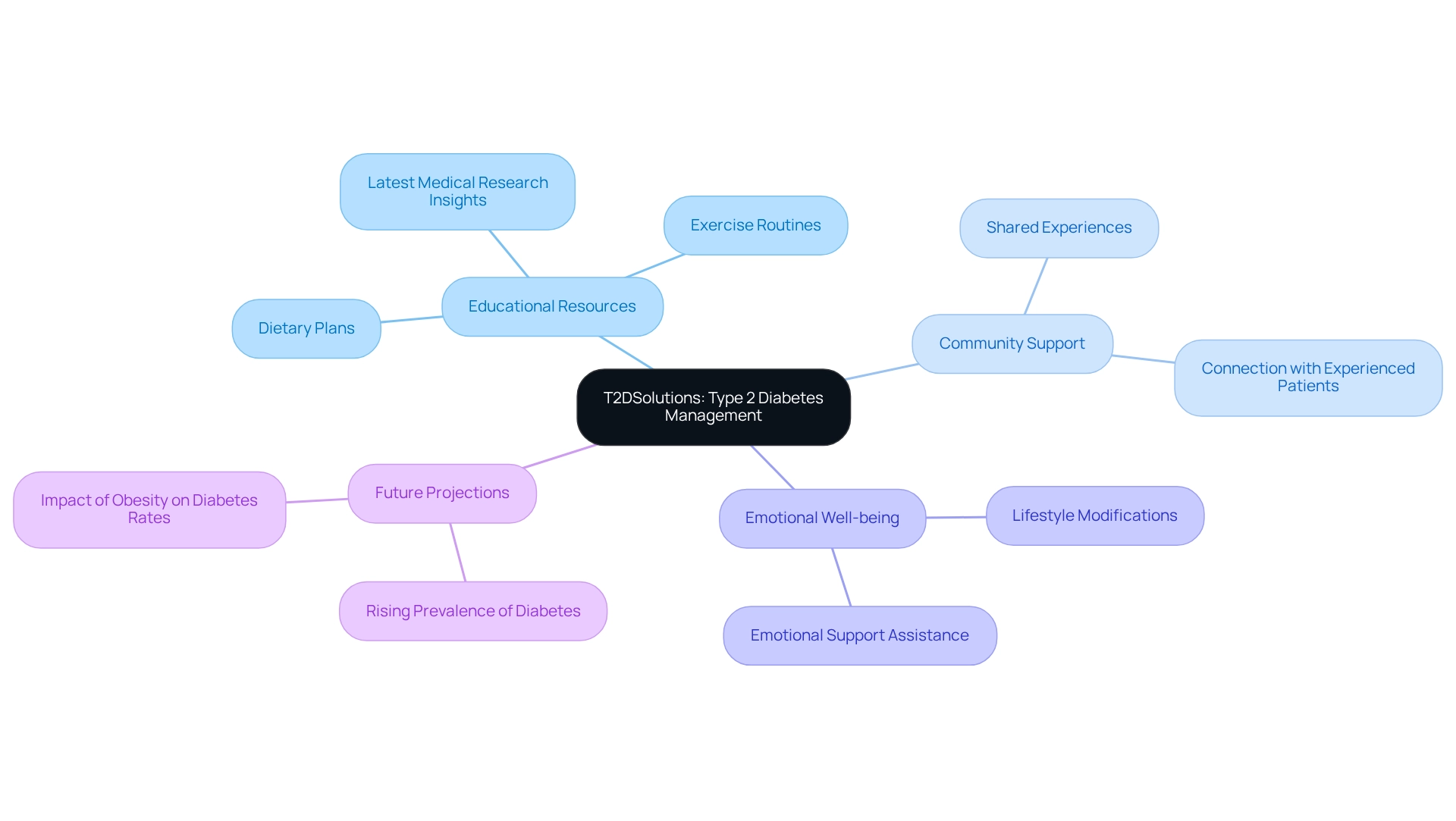
Fatty Fish: Rich in Omega-3s for Heart Health
Fatty fish, such as salmon, mackerel, and sardines, are wonderful sources of omega-3 fatty acids, which can greatly benefit your heart health. Including fatty fish in your diet regularly can help lower triglycerides, ease inflammation, and improve overall cardiovascular well-being. If you have Type 2 Diabetes, adding healthy foods for type 2 diabetes, such as fatty fish, to your meals can also support blood sugar management. It's a good idea to aim for at least two servings of fatty fish each week to enjoy these health benefits.
However, as Freydis Hjalmarsdottir notes, 'more research is needed, as some studies have produced mixed results.' This highlights that we are still exploring the role of omega-3s in managing diabetes. It's important to recognize that many individuals with Type 2 Diabetes are not meeting the recommended intake of fatty fish, which underscores the need to incorporate healthy foods for type 2 diabetes into their diets. Remember, you’re not alone in this journey, and small changes can lead to significant improvements in your health.
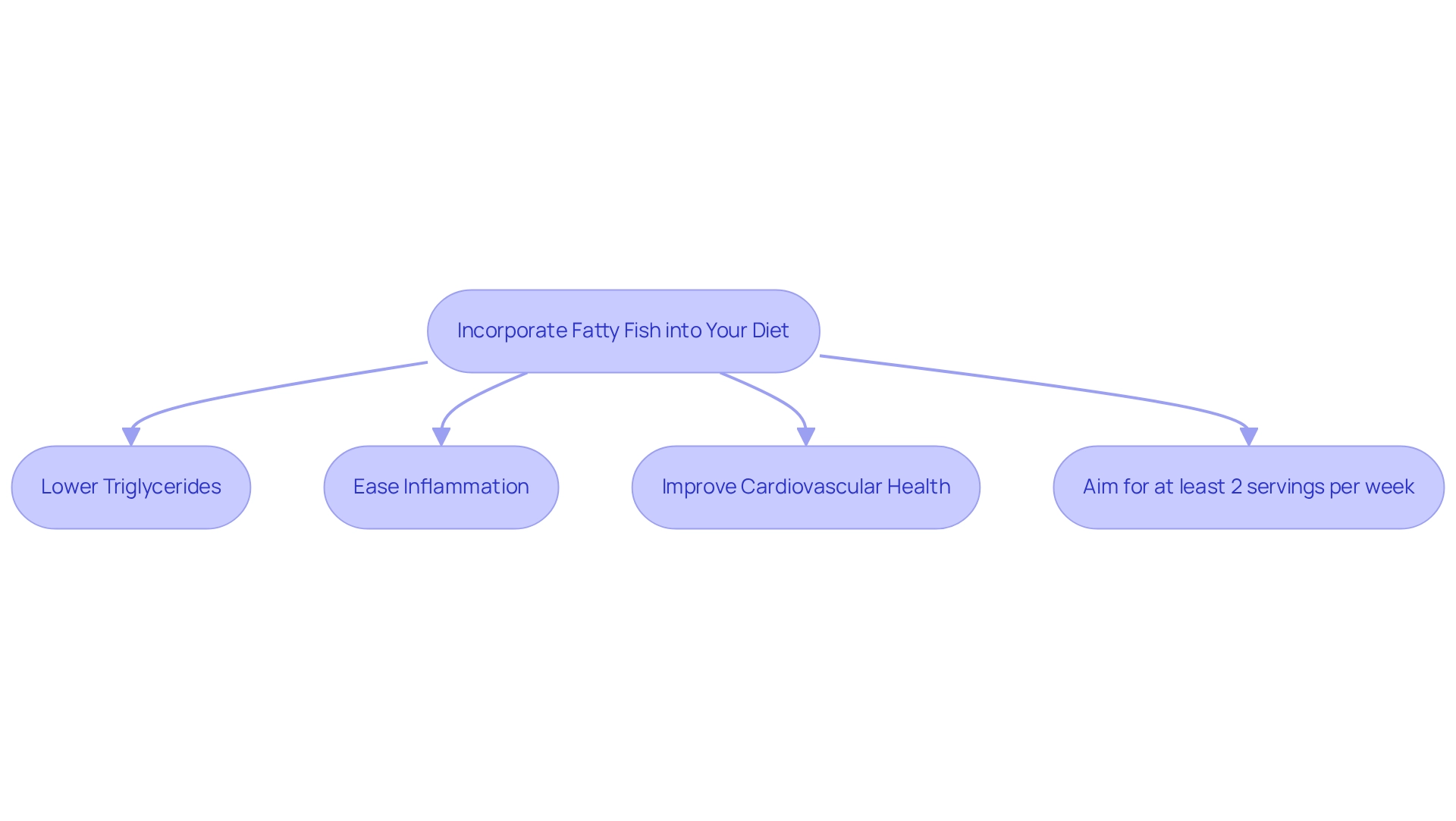
Leafy Greens: Nutrient-Dense and Low-Calorie Options
Leafy greens, such as spinach, kale, and collard greens, are considered healthy foods for type 2 diabetes because they are not only nutrient-dense but also low in calories, making them wonderful allies in managing the condition. These vibrant vegetables are rich in vitamins A, C, and K, along with essential minerals like calcium and iron, offering a wide array of health benefits. Their high fiber content is particularly important, as it helps regulate glucose levels and promotes a sense of fullness, which can prevent overeating.
It's understandable to feel overwhelmed by dietary choices, but studies suggest that incorporating a variety of leafy vegetables into your meals can significantly boost nutrient absorption and improve glucose regulation. For example, research has shown that regular consumption of leafy greens is associated with better glycemic control among diabetes patients. Nutritionists emphasize that healthy foods for type 2 diabetes, including fiber-rich greens, are crucial for maintaining stable blood sugar levels.
As Amanda Kraft wisely points out, focusing on whole foods without labels can simplify your dietary choices and encourage healthier eating habits, especially when it comes to nutrient-dense options like leafy greens. To truly maximize the benefits, consider adding arugula to your salads or smoothies; its peppery flavor and nutritional profile complement other cruciferous vegetables, offering both taste and health advantages.
By incorporating these greens, which are healthy foods for type 2 diabetes, into your diet, you can enjoy a flavorful and nutritious approach to managing blood sugar. Remember, you’re not alone in this journey. It’s always advisable to consult a specialist for personalized medical advice regarding dietary changes, ensuring your approach to managing diabetes is tailored to your individual needs. We are here to support you every step of the way.
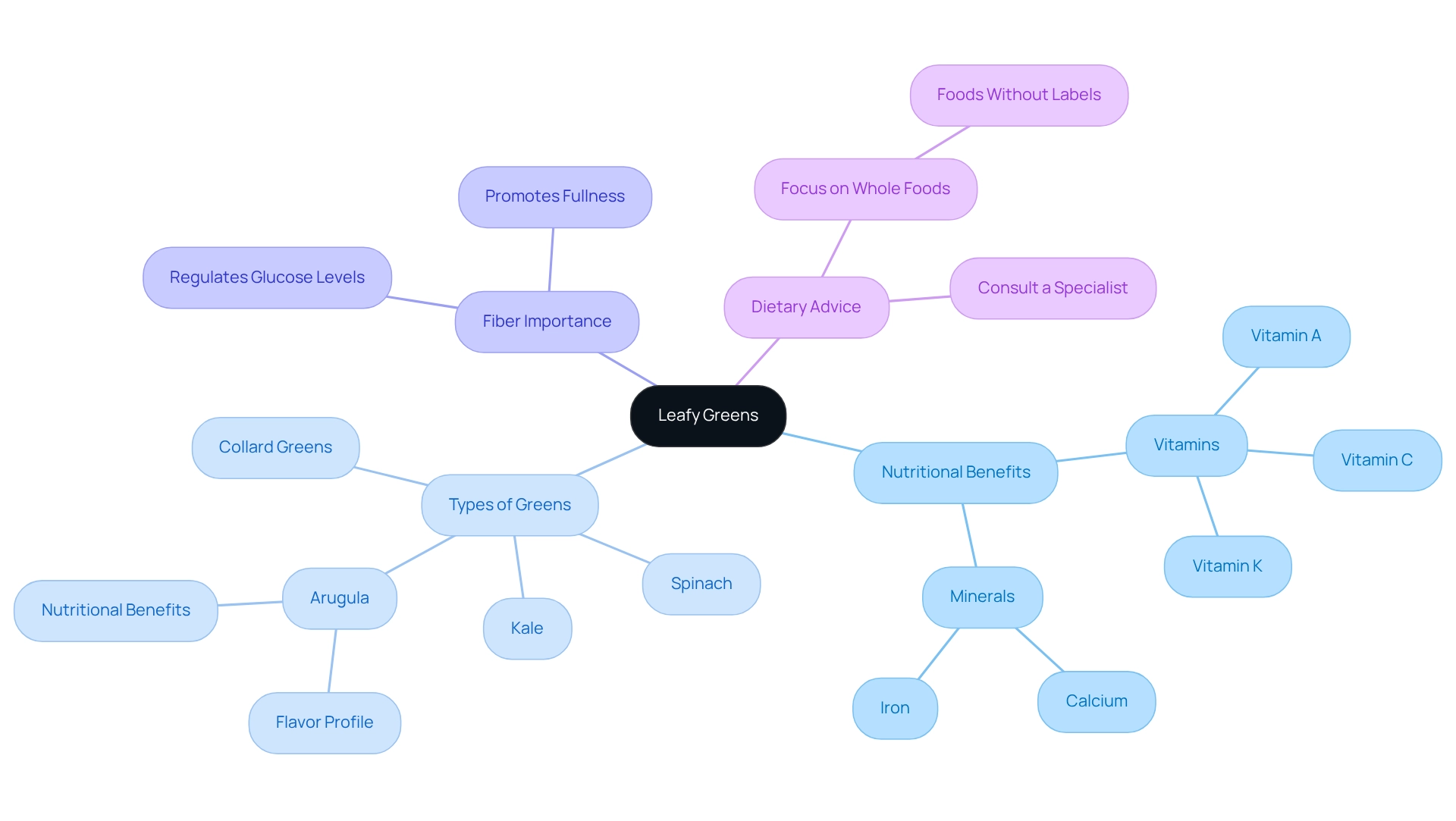
Avocados: Healthy Fats and Fiber for Blood Sugar Control
Avocados are a wonderful source of healthy monounsaturated fats and fiber, making them one of the healthy foods for type 2 diabetes for anyone aiming to manage their condition. These nutritious fats can help lower harmful cholesterol levels, while the fiber content plays a crucial role in stabilizing sugar levels. Research shows that regularly enjoying avocados may enhance insulin sensitivity, which is essential for maintaining balanced blood glucose levels. In fact, studies indicate that individuals with Type 2 Diabetes who include healthy foods for type 2 diabetes, such as avocados, in their meals often experience improved metabolic health.
You can enjoy avocados in so many delightful ways—add them to your salads, blend them into smoothies, or spread them on whole-grain toast for a nutritious boost. Remember, you’re not alone in this journey; many are finding ways to incorporate healthy foods into their lives. For more tips on managing Type 2 Diabetes and to explore additional resources, visit T2DSolutions, your comprehensive hub for education and support related to this condition. We are here to support you every step of the way.
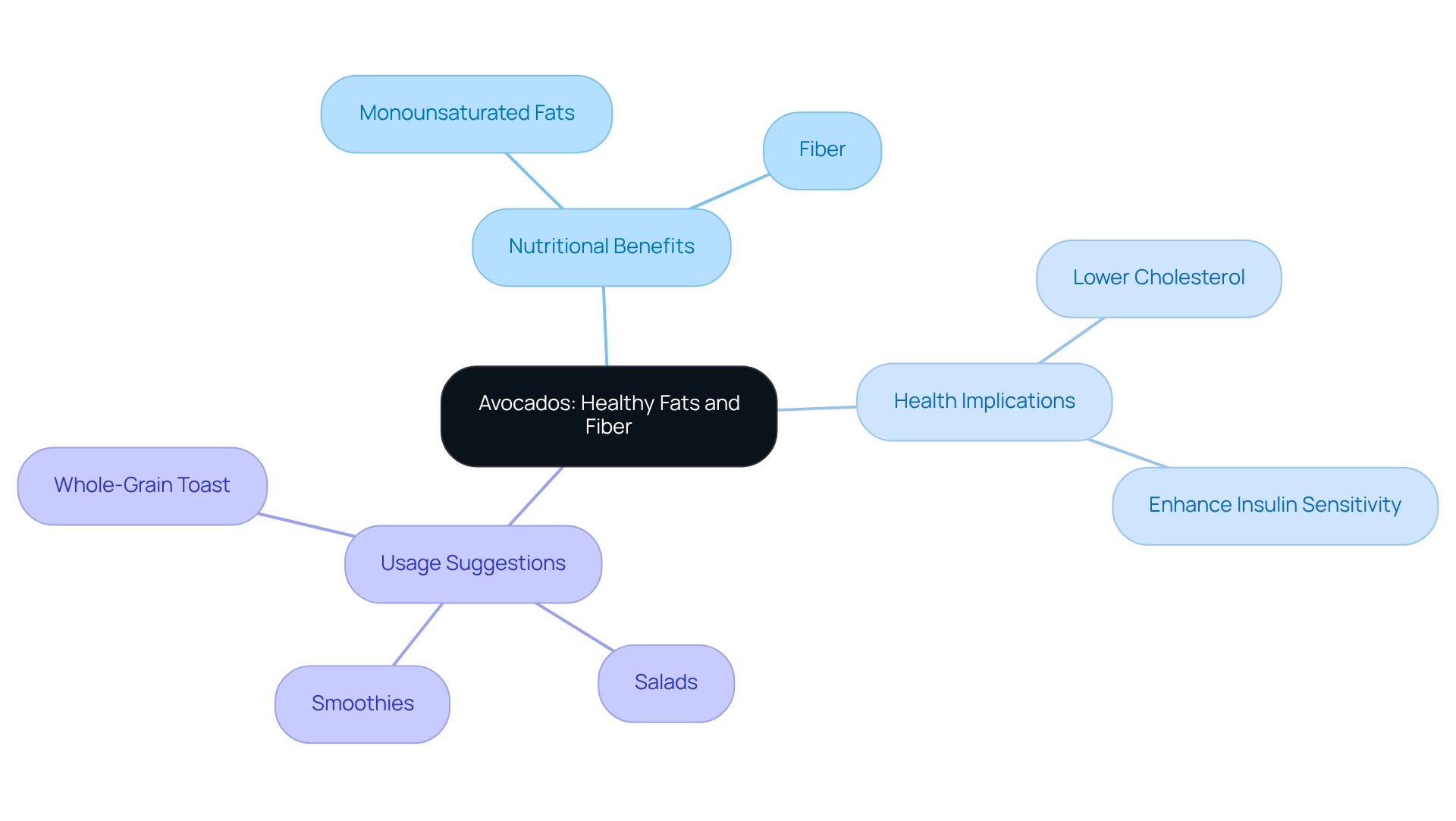
Eggs: High-Quality Protein for Sustained Energy
Eggs are a wonderful source of high-quality protein, brimming with essential nutrients like vitamin D and choline. They can be a valuable addition to your diet, especially if you're incorporating healthy foods for type 2 diabetes while navigating life with this condition. Incorporating eggs into your meals can provide sustained energy and help regulate hunger, which is so important for managing diabetes effectively.
Recent studies have shown that consuming up to 12 eggs weekly does not negatively impact glucose levels and may even enhance insulin sensitivity, promoting your overall metabolic well-being. Whether you enjoy them boiled, scrambled, or poached, eggs are a versatile protein source that can fit seamlessly into a balanced diet.
Nutrition experts emphasize the importance of healthy foods for type 2 diabetes, noting that protein, such as eggs, can play a significant role in managing blood sugar levels within a diabetes-friendly meal plan. As dietary guidelines evolve, the inclusion of eggs in moderation is increasingly recognized for its nutritional benefits, reflecting a shift in understanding how dietary cholesterol affects our health.
At T2DSolutions, we are dedicated to providing extensive resources for managing blood sugar levels. Our meal planning guides highlight healthy foods for type 2 diabetes, including nutritious options like eggs, designed to support you on your journey. Remember, consulting with healthcare providers or registered dietitians can help tailor your dietary choices to your personal needs, ensuring optimal health outcomes. You're not alone in this journey; we are here to support you every step of the way.
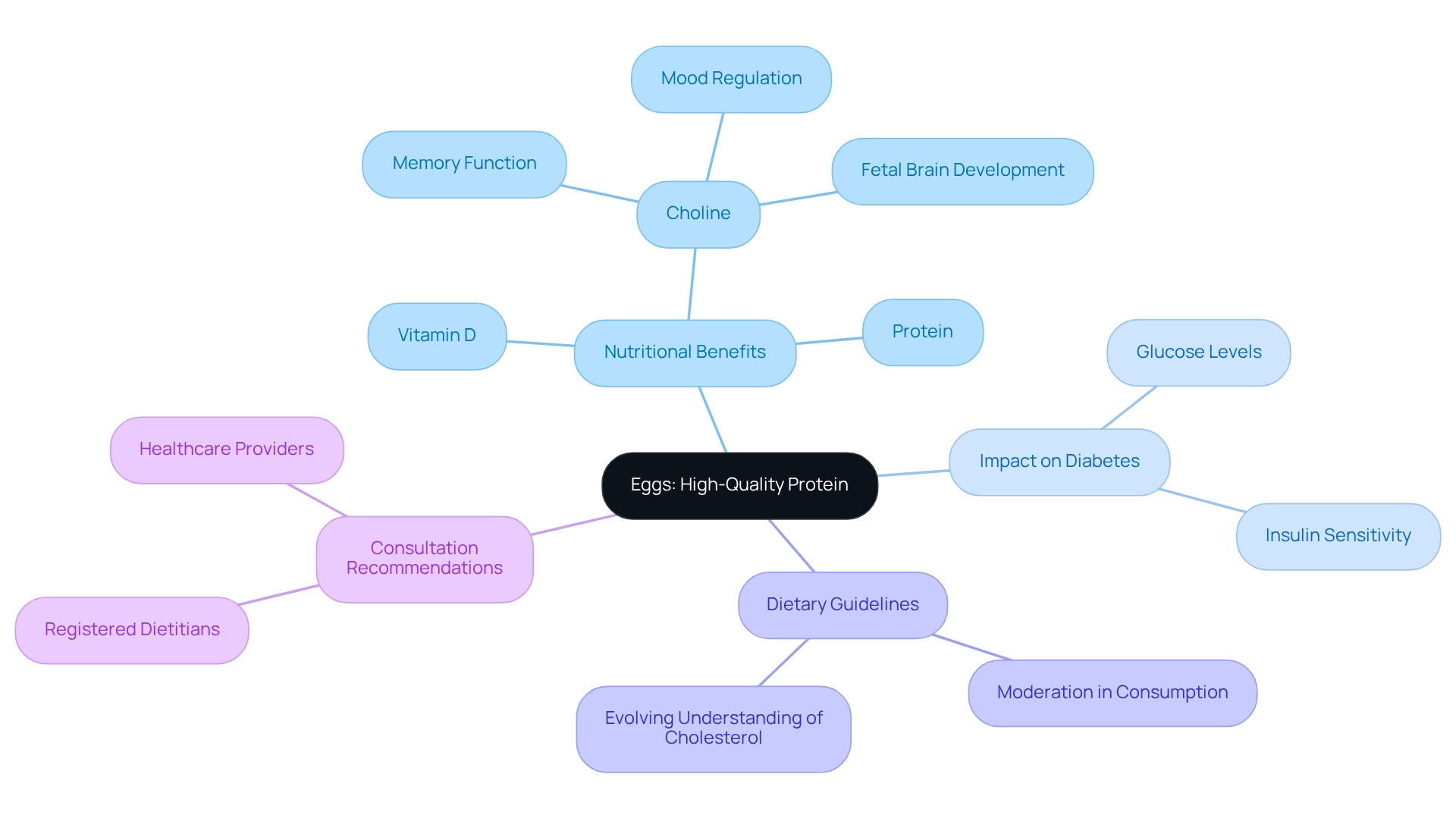
Chia Seeds: Fiber-Rich Superfood for Blood Sugar Stability
Chia seeds are truly a nutritional powerhouse, brimming with fiber, protein, and omega-3 fatty acids. Their high soluble fiber content plays a crucial role in stabilizing glucose levels by slowing digestion and preventing post-meal spikes. For those managing Type 2 Diabetes, the low carbohydrate profile of chia seeds makes them one of the healthy foods for type 2 diabetes. You might find it simple and delicious to incorporate chia seeds into your diet; consider adding them to your smoothies, yogurt, or oatmeal for an extra nutrient boost.
Recent studies suggest that regular intake of chia seeds can improve overall glucose stability, making them one of the healthy foods for type 2 diabetes in any management strategy for individuals dealing with blood glucose issues. Nutritionists emphasize the importance of healthy foods for type 2 diabetes, particularly fiber-rich options like chia seeds, in promoting better glycemic control and overall health. By thoughtfully incorporating these seeds into your meals and snacks, you can enhance your nutrient consumption while effectively managing your glucose levels. Remember, you're not alone in this journey, and small changes can lead to significant improvements in your health.
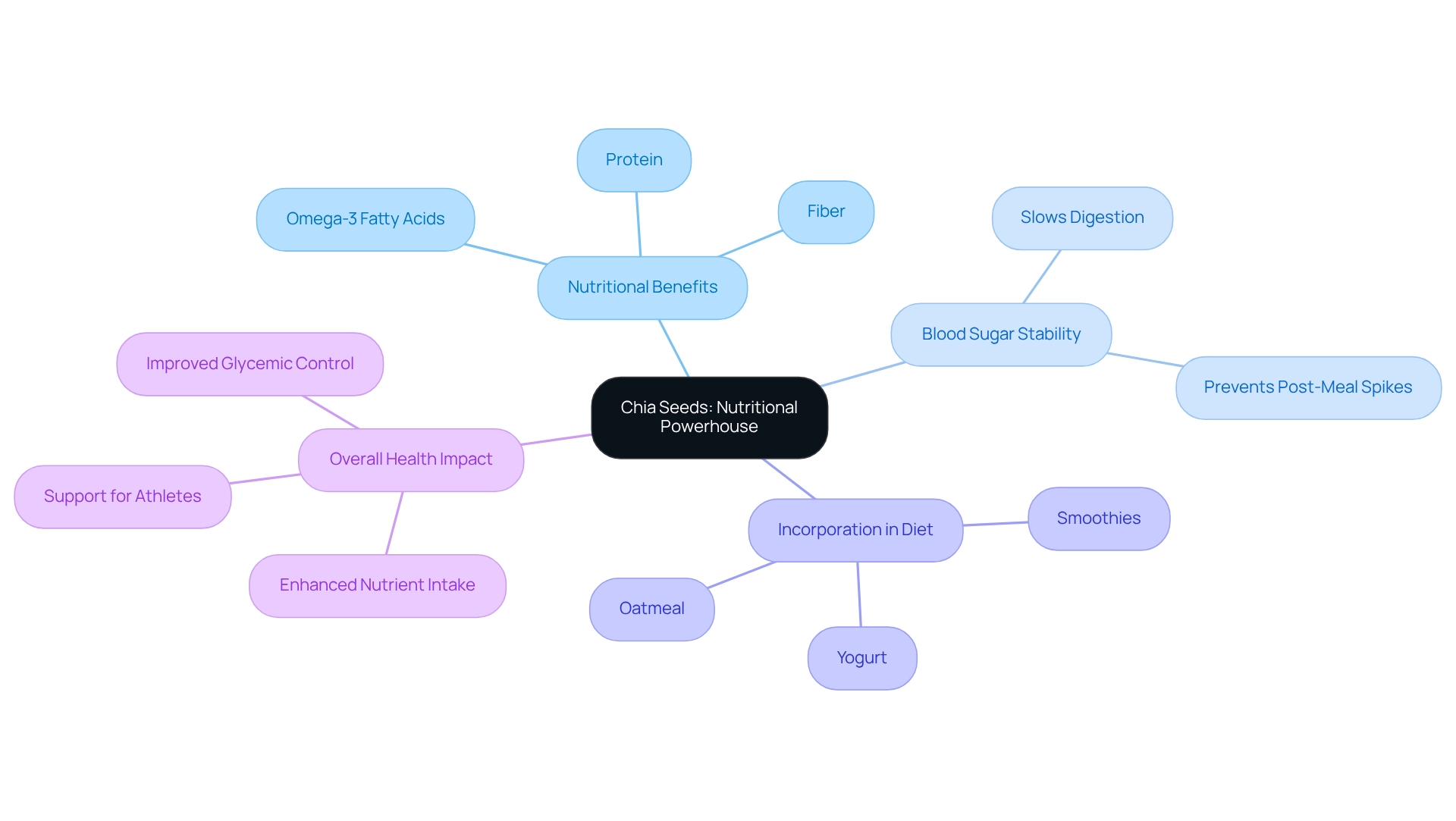
Beans: Protein and Fiber Powerhouses for Diabetes
Beans, including black beans, kidney beans, and lentils, are not just nutritious; they are excellent sources of both protein and fiber. Their low glycemic index means they are considered healthy foods for type 2 diabetes, as they have a minimal effect on glucose levels. The fiber in beans helps enhance satiety and supports digestive well-being, which can be comforting during your journey.
Incorporating beans into your meals can be simple and rewarding. Consider adding them to:
- Salads
- Soups
- As a delightful side dish
Recent studies suggest that pairing beans with other food groups, like vegetables and lean proteins, can further reduce the impact of carbohydrates on glucose levels. This can significantly improve your overall management strategies.
It's essential to keep an eye on carbohydrate intake when consuming beans, especially varieties like chickpeas and lentils, which may have higher carbohydrate content. Remember, you're not alone in this journey. Statistics show that individuals with Type 2 Diabetes who regularly consume healthy foods for type 2 diabetes like beans experience improved blood sugar control and overall health outcomes.
By incorporating beans into your diet, you can take a meaningful step towards better blood sugar management and include healthy foods for type 2 diabetes in your lifestyle. For more information on managing Type 2 Diabetes through diet and community support, explore T2DSolutions, your comprehensive resource hub. We are here to support you every step of the way.
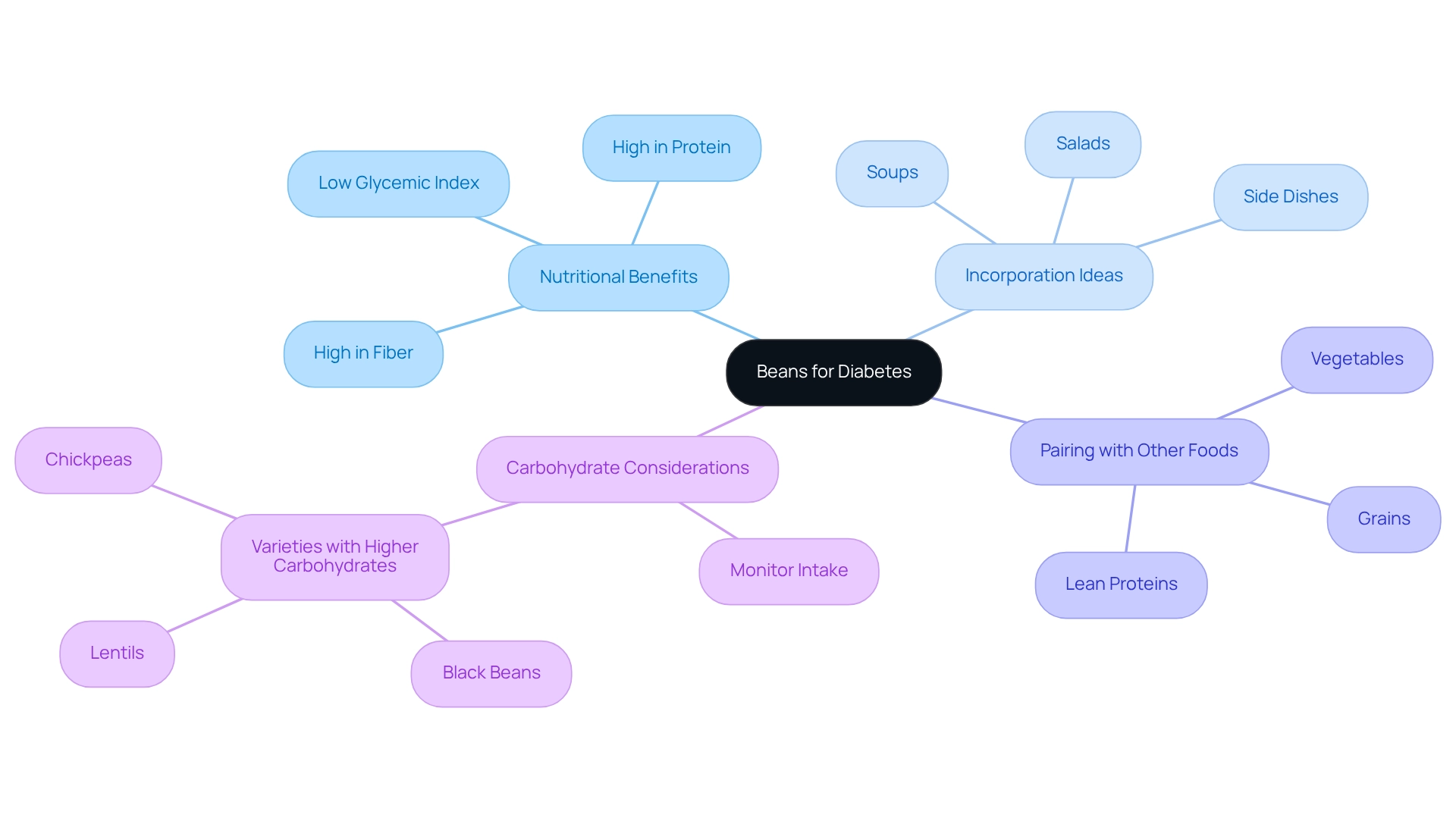
Greek Yogurt: Probiotic-Rich Option for Gut and Blood Sugar Health
Greek yogurt is a nutrient-dense food, rich in protein and probiotics, making it one of the healthy foods for type 2 diabetes. The probiotics in Greek yogurt are known to improve gut health, an essential element in blood glucose regulation. It's understandable to feel overwhelmed by health concerns, but studies suggest that a healthy gut microbiome can positively affect metabolic processes, potentially assisting in managing blood sugar levels.
To maximize its benefits, consider opting for unsweetened varieties to avoid added sugars. Greek yogurt can be a satisfying snack, blended into smoothies, or used in both sweet and savory dishes, thanks to its creamy texture. Recently, the FDA's approval of yogurt's wellness advantages emphasizes its potential in public welfare strategies aimed at preventing blood sugar issues. This underscores its contribution to tackling the Type 2 sugar condition crisis, and you're not alone in seeking ways to improve your health.
As part of T2DSolutions' commitment to providing comprehensive resources for managing blood sugar levels, think about incorporating Greek yogurt into your daily meals. For instance, you can:
- Add it to breakfast bowls with fresh fruits and nuts
- Use it as a base for salad dressings
- Mix it into soups for added creaminess
Statistics indicate that Greek yogurt intake is increasing among individuals with health conditions, demonstrating a rising awareness of its advantages. Nutrition specialists highlight the importance of including healthy foods for type 2 diabetes, such as probiotic-rich foods like Greek yogurt, in a balanced diet, as they can aid in improved glucose regulation.
By incorporating Greek yogurt into your daily meals, you can take a proactive step toward improving your overall health and effectively managing blood sugar levels. Remember, we're here to support you every step of the way.
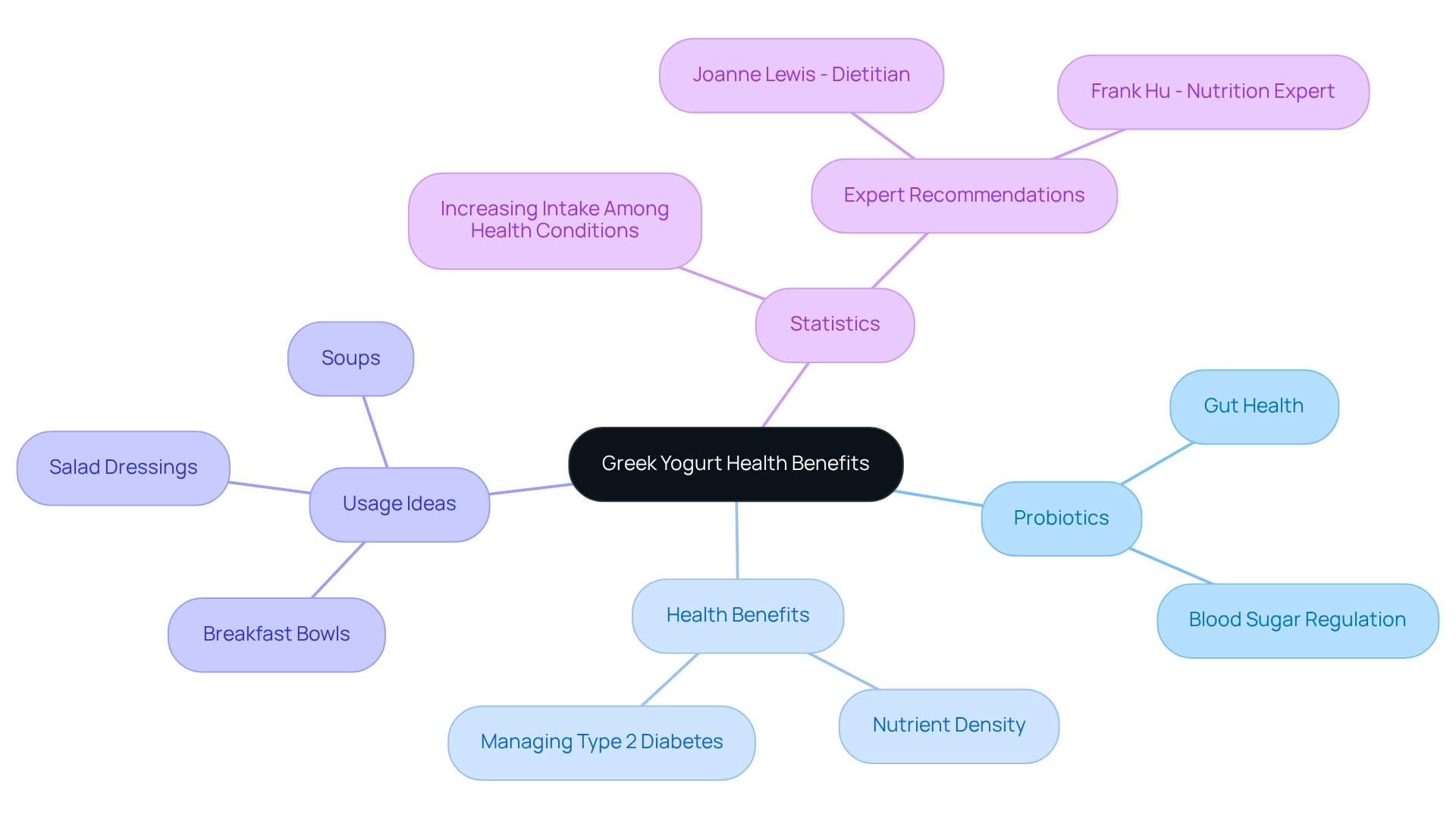
Nuts: Healthy Fats for Satiety and Blood Sugar Management
Nuts, such as almonds, walnuts, and pistachios, are nutrient-dense foods packed with healthy fats, fiber, and protein. These attributes not only promote satiety but also help reduce overall calorie intake, making them healthy foods for type 2 diabetes and an ideal snack for individuals managing this condition. It's understandable to feel concerned about dietary choices, but studies indicate that consistent nut intake can enhance glucose regulation and reduce the risk of heart conditions. This is essential, as elevated glucose levels can lead to serious complications such as heart issues, nerve damage, and kidney problems.
Research continues to emphasize the beneficial effect of nuts on blood sugar control. For example, the PREDIMED study revealed that a Mediterranean diet enriched with nuts significantly benefits Type 2 Diabetes prevention. By including a small handful of nuts in your daily routine—whether as a snack or a crunchy enhancement to salads and yogurt—you can take a straightforward yet effective step toward improved glucose management.
Health professionals stress the importance of healthy foods for type 2 diabetes, noting that nuts can play a vital role in a balanced diet. As Tiffany Danczak wisely stated, "Pick yourself up and strive to be better!" By encouraging lifestyle modifications that involve nutritious eating and physical activity, T2DSolutions is here to support you in controlling your condition. The nutritional advantages of nuts extend beyond glucose regulation; they also provide vital vitamins and minerals that contribute to overall well-being. Thus, integrating nuts into your diet can be a delicious and beneficial choice as one of the healthy foods for type 2 diabetes. Make it a point to include nuts in your meals and snacks to enhance your diabetes management strategy. Remember, you're not alone in this journey, and every small change can make a difference.
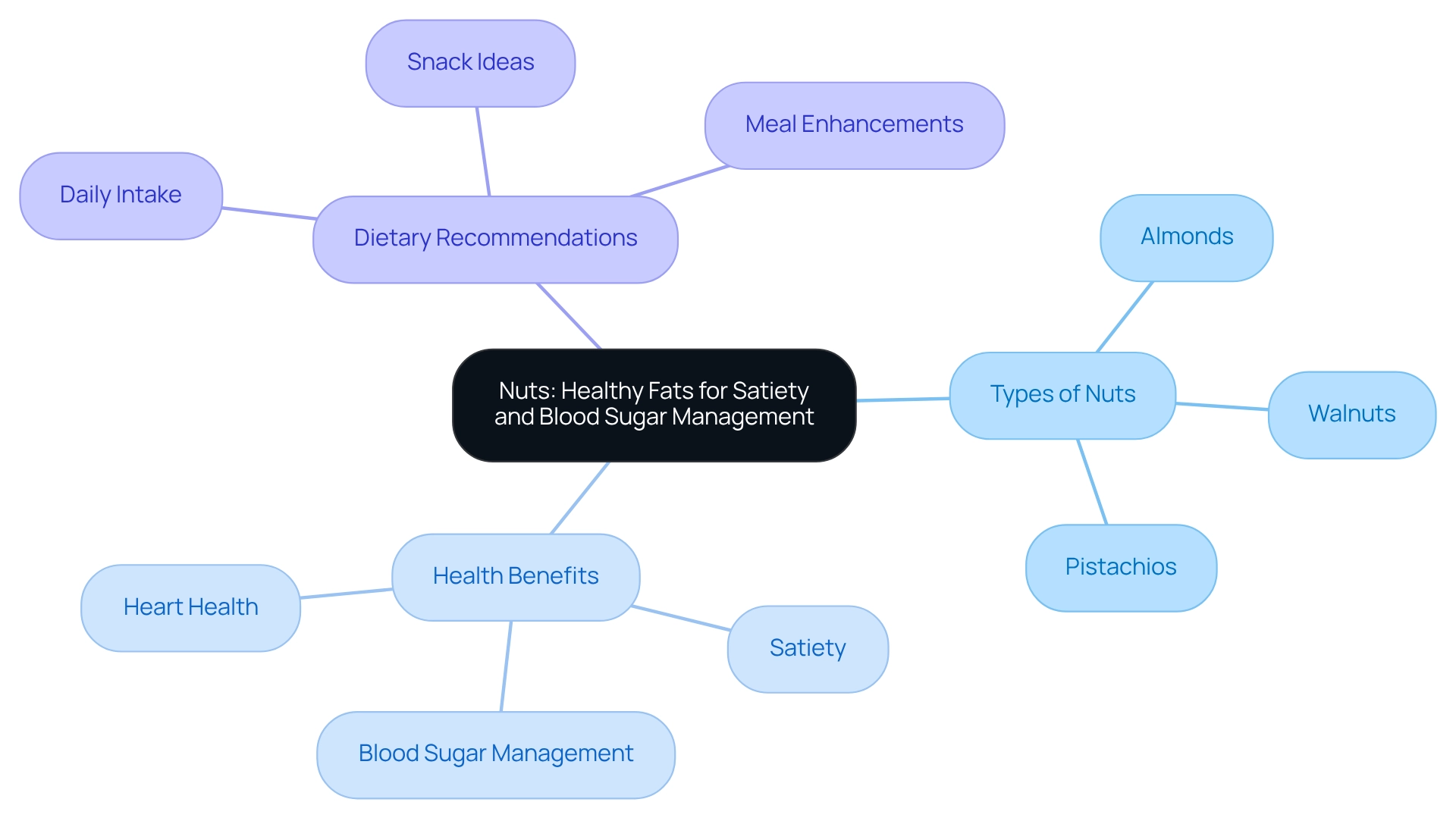
Broccoli: Low-Carb Vegetable Packed with Nutrients
Broccoli is a nutrient-dense, low-carb vegetable that offers a wealth of benefits. Rich in vitamins C and K, fiber, and antioxidants, it is among the healthy foods for type 2 diabetes. Its low glycemic index means it has minimal impact on blood sugar levels, making it one of the healthy foods for type 2 diabetes.
Regularly incorporating broccoli into your diet may support heart health and help reduce inflammation. It's understandable to feel overwhelmed by dietary changes, but we encourage you to explore the many ways you can enjoy broccoli. Whether in stir-fries, salads, or as a steamed side dish, there are countless delicious options available.
At T2DSolutions, we are here to support you every step of the way. We invite you to explore our resources for more tips on effectively including this nutritious vegetable in your diabetes management plan. Remember, you're not alone in this journey—together, we can make healthy choices that benefit your well-being.
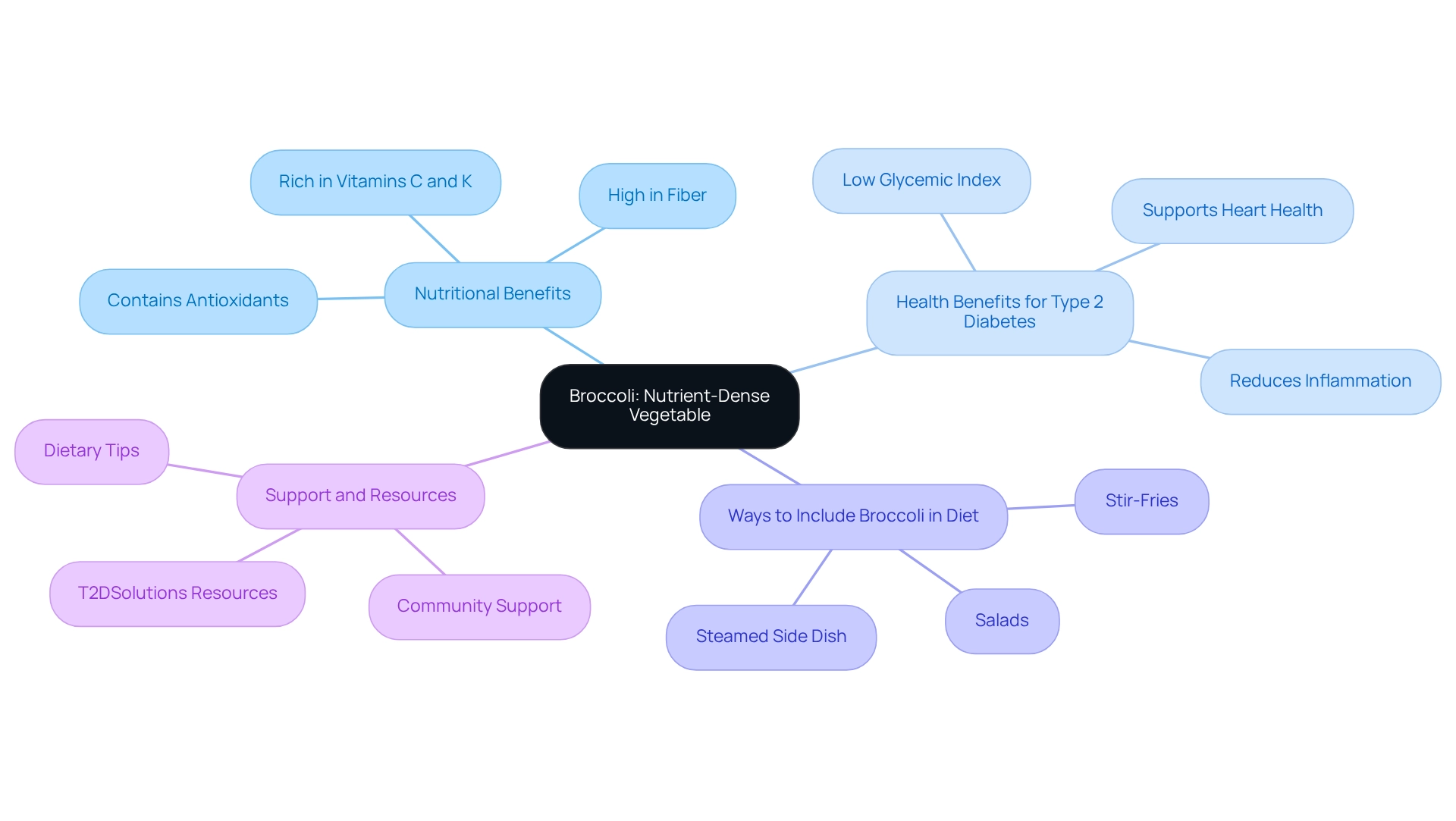
Conclusion
A well-rounded diet is crucial for effectively managing Type 2 Diabetes, and T2DSolutions serves as an essential resource in this journey. By providing a wealth of educational materials and community support, individuals can navigate their dietary choices with confidence. It's important to remember that incorporating nutrient-dense foods such as:
- Fatty fish
- Leafy greens
- Avocados
- Eggs
- Chia seeds
- Beans
- Greek yogurt
- Nuts
- Broccoli
plays a significant role in regulating blood sugar levels and promoting overall health.
The diverse range of foods highlighted in this guide not only supports blood sugar control but also enhances metabolic health and provides essential nutrients. Emphasizing fiber-rich options and healthy fats can lead to improved satiety and better heart health, which are vital for individuals managing diabetes. Moreover, fostering a sense of community through shared experiences and support systems strengthens the journey toward effective diabetes management.
Ultimately, taking actionable steps towards a balanced diet, supported by reliable resources like T2DSolutions, empowers individuals to take charge of their health. By embracing these dietary strategies and prioritizing nutrient-dense foods, you can positively influence your diabetes management and improve your quality of life. Remember, making informed choices today can lead to a healthier tomorrow—effective diabetes management is within reach for everyone. You're not alone in this journey; we are here to support you every step of the way.
Frequently Asked Questions
What is T2DSolutions, and how does it help individuals with Type 2 Diabetes?
T2DSolutions is a comprehensive resource dedicated to empowering individuals and families affected by Type 2 Diabetes. It offers educational resources, dietary plans, exercise routines, and insights into the latest medical research to help manage blood sugar levels effectively.
What kind of community support does T2DSolutions provide?
T2DSolutions fosters community engagement by connecting newly diagnosed patients with experienced individuals, enhancing emotional support and resilience throughout the management journey.
How prevalent is Type 2 Diabetes, and why is T2DSolutions important?
Projections suggest that one in three adults may develop Type 2 Diabetes by 2050, making T2DSolutions a crucial resource for addressing educational needs and fostering long-term well-being through community support.
What are the health benefits of including fatty fish in the diet?
Fatty fish, such as salmon, mackerel, and sardines, are rich in omega-3 fatty acids, which can lower triglycerides, ease inflammation, and improve overall cardiovascular health. They can also support blood sugar management in individuals with Type 2 Diabetes.
How often should one consume fatty fish for optimal health benefits?
It is recommended to aim for at least two servings of fatty fish each week to enjoy their health benefits.
What are the nutritional advantages of leafy greens for individuals with Type 2 Diabetes?
Leafy greens like spinach, kale, and collard greens are nutrient-dense, low in calories, and high in fiber, which helps regulate glucose levels and promotes fullness, potentially preventing overeating.
How can incorporating leafy greens into meals benefit glucose regulation?
Regular consumption of leafy greens is associated with better glycemic control among diabetes patients, enhancing nutrient absorption and improving overall health.
What dietary approach is suggested for managing Type 2 Diabetes?
Focusing on whole foods without labels, such as nutrient-dense leafy greens, can simplify dietary choices and encourage healthier eating habits.
Is it necessary to consult a specialist when making dietary changes for diabetes management?
Yes, it is advisable to consult a specialist for personalized medical advice regarding dietary changes to ensure an effective approach tailored to individual needs.



